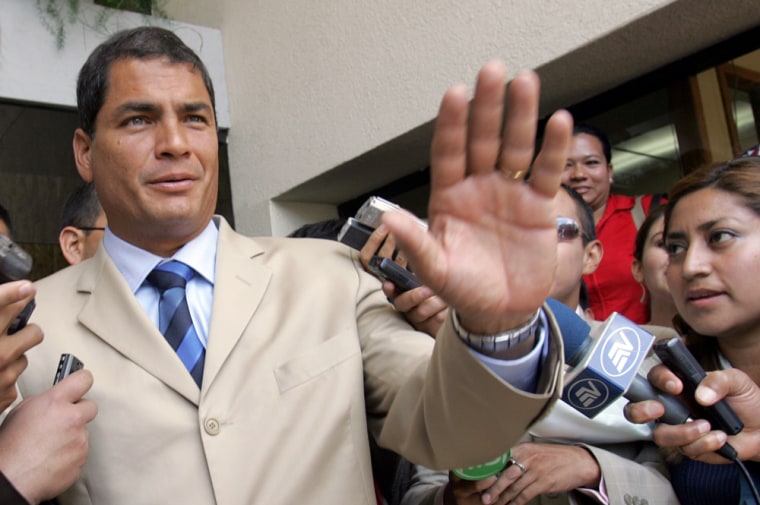Rafael Correa, the apparent winner of Ecuador’s presidency, said Tuesday he would renegotiate foreign oil contracts in order to more than quadruple the share of crude volume received by the state.
Correa, who made the oil contract renegotiation a key part of his campaign platform, also said he might seek to increase the share of extra oil revenue that private companies are forced to give the state under a recent law.
His pledges to increase state control over energy resources have sparked fears his government could meddle with private energy companies like other leftist leaders in the region.
“Starting January 16th, we will sit down and try to renegotiate the volume, the participation of the state in these contracts,” Correa told foreign reporters in Quito Tuesday. He would be sworn into office Jan. 15.
He said the state currently receives 20 percent of the crude extracted from its soil and his government will seek to boost that share from all companies to around 85 percent.
The hydrocarbons law, approved earlier this year, demands companies share with the government at least 50 percent of extra revenue above a set benchmark. Foreign oil operators have opposed the law as unfair.
No nationalization
Correa, who calls Venezuelan President Hugo Chavez a friend, has rejected any energy nationalization that could trigger jitters among investors and private companies and welcomes foreign investment in the oil sector.
Chavez is a sharp critic of U.S. policy and has sought to forge an alliance of left-wing governments to counter U.S. influence in the region with his own brand of socialist revolution.
A top election official said Tuesday that Correa, a U.S.-trained economist, had won Sunday’s presidential run-off election. Other election officials said the official announcement would come Thursday.
Correa also said his government may seek to increase the share of extra oil revenue received by the state to 85 percent. The law currently says the state should receive at least 50 percent of those revenues.
Some of the biggest investors in Ecuador’s energy sector are Brazil’s Petrobras and Spain’s Repsol YPF.
Correa said a legal dispute with Occidental Petroleum Corp. over its assets in the country was a “closed case” in which Ecuadorean law had been applied.
Ecuador terminated its contract with the Los Angeles-based company and took over its assets in May after accusations that the firm sold part of an oil block without government authorization. The company has filed an arbitration claim seeking $1 billion in damages and the return of its assets.
An Occidental spokesperson declined to comment.
Calls for pragmatism
“He hasn’t really taken over yet and I think he is still excited with the election results,” said Roger Tissot, Latin American analyst with Washington-based consultancy PFC Energy.
“When he is in power, perhaps reality will sink in and he will slowly reach a pragmatic middle ground that works for everything, like in Bolivia.” he added.
Bolivia’s move to nationalize its energy sector earlier this year spooked foreign oil companies and investors.
However, energy companies in Bolivia now say their new contracts are as profitable as the old ones and political analysts say Bolivian President Evo Morales has shown himself to be less radical than his critics feared.
Ecuador, South America’s fifth-largest oil producer, has an output of around 530,000 barrels of oil per day, which is extracted evenly by the state oil company and foreign operators.
